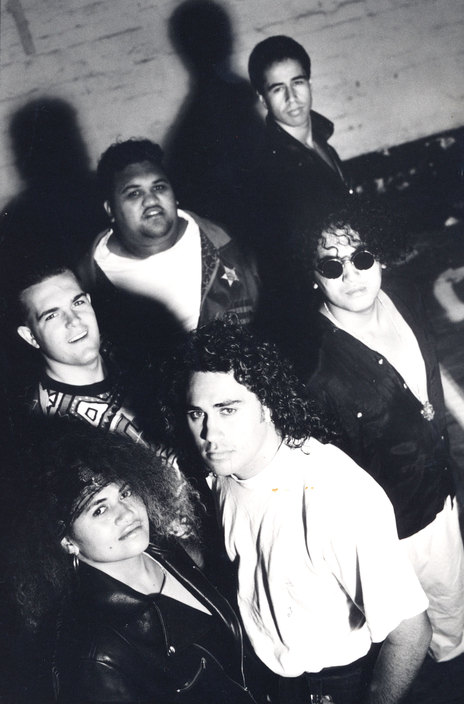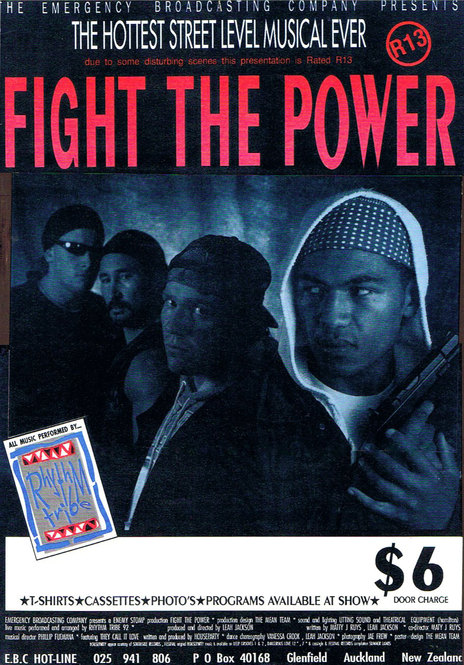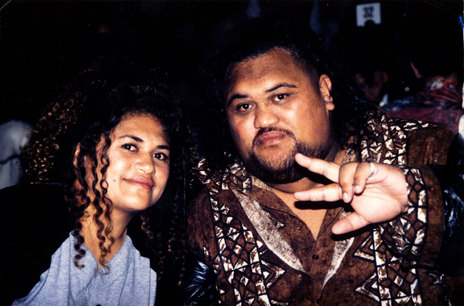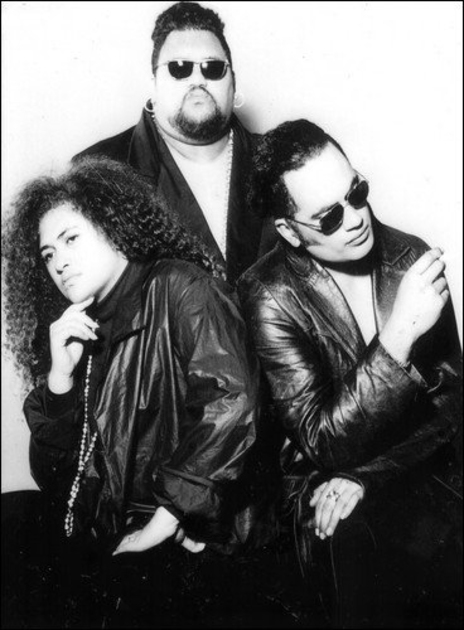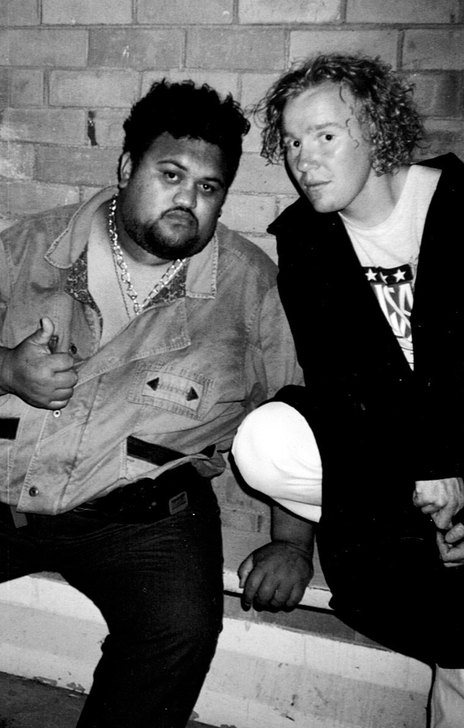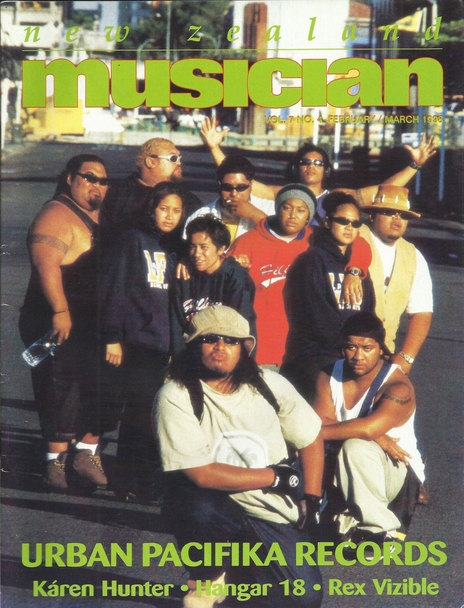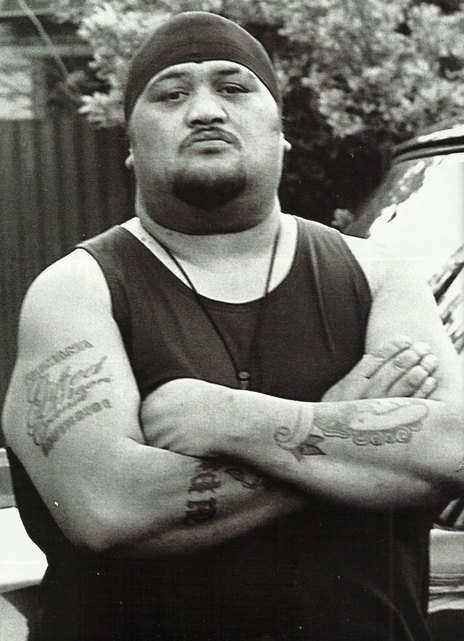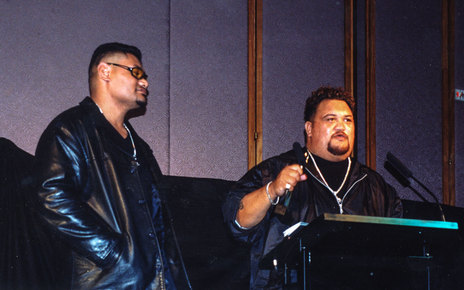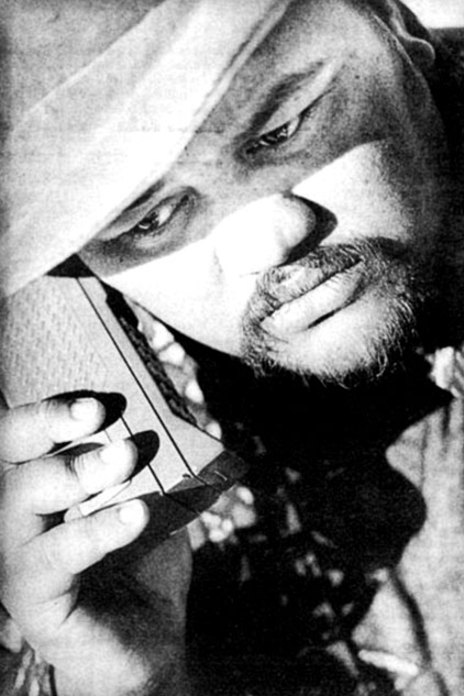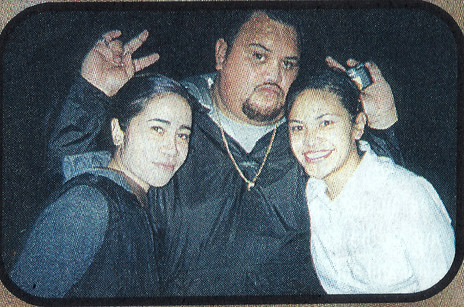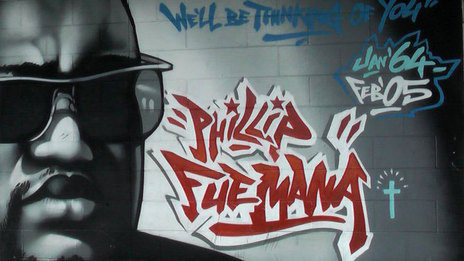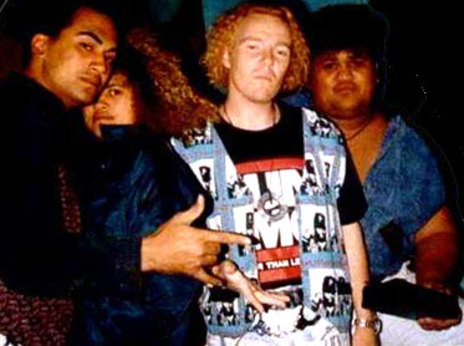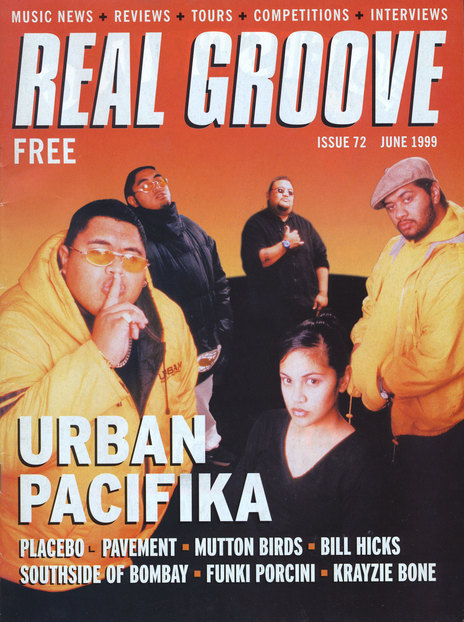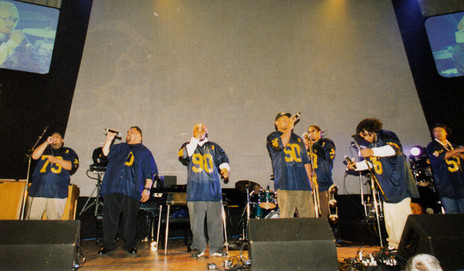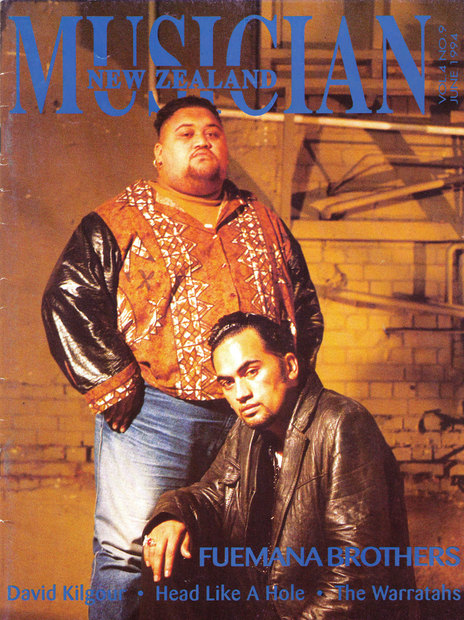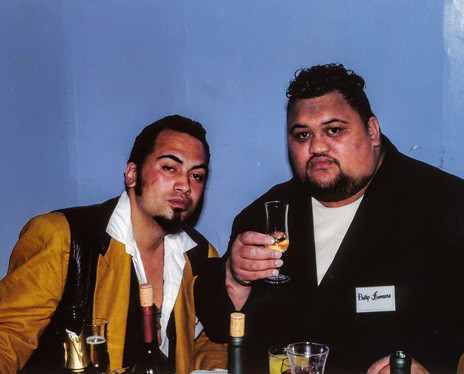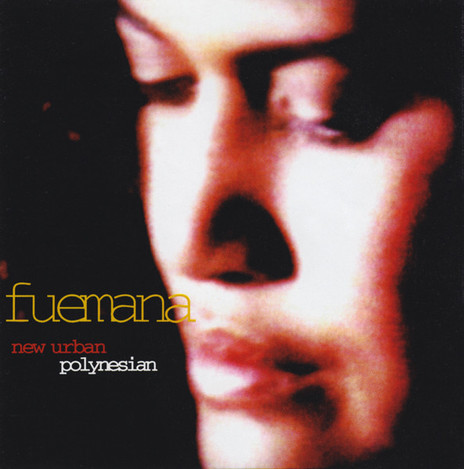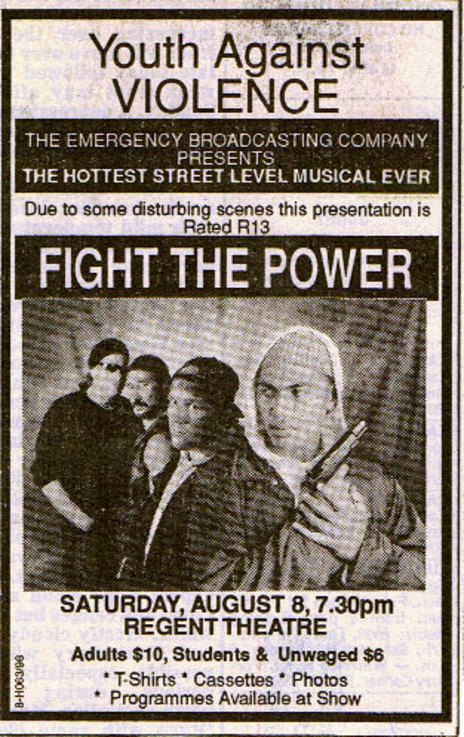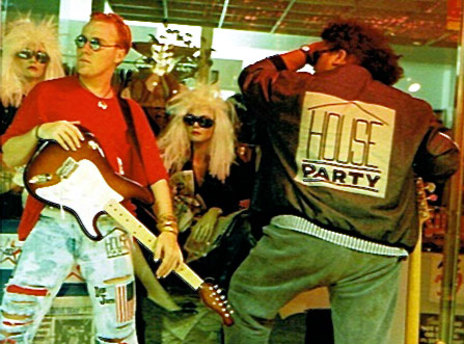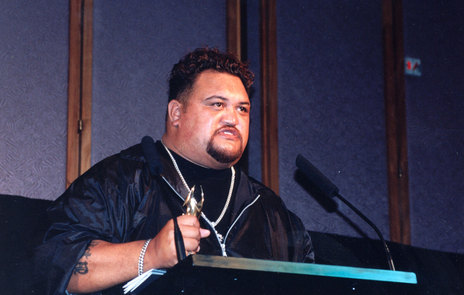From Parnell to Otara
“I was born in Otara but we shifted to Parnell. All the coconuts used to work on the wharves. Then our house was condemned to be knocked down … basically my mother left my dad and moved to Australia when I was five, which made Paul – the youngest – something like 18 months.”
Phil’s father was from Niue, and his mother was Māori, from Taranaki. The couple had four children: Phil, Tony, Christina, and Paul.
“So here’s this coconut guy who’s only 29 or 30 with four kids – one in a bassinet, one in a cot – living in the slum of Parnell, going to work and leaving us at home. Social welfare wasn’t on the ball like it is now, so you’d have me – this five-year old looking after the other kids, all just waiting at home for Dad to come home. He’d shoot home every now and then, cos the wharfs were just down the road. Shoot home to check on us, go backwards and forwards.”
A few years later, the family moved to Otara, which Fuemana remembers as being a much better spot: “It was like paradise – a quarter acre, fences, a proper house, three bedrooms, clean and tidy.” (Hiphop Music in Aotearoa, by Gareth Shute, 2004.)
Christianity
In his late teens, Phil changed his path. “I had this weird experience and discovered Jesus, I didn’t quite know what was happening to me at the time. My family were all really scared of me and someone had broken the strings on my bass and they thought I’d kill them – but it was like a turning point in my life and I just cried. It was like I could feel for the first time in many years. I felt like I'd been woken up … I don’t make a big deal about the Christianity thing but I was turned around and my whole life changed.” (Stamp magazine issue No.45, interview by Emma Farry, 1994)
“Then this thing came up where we could audition for the Youth for Christ team ... I went there, blew them away. I was the first browny on that team … the whole church raised money for me – bought me clothes – I had nothing … that’s when I really picked up my musical chops. We went all around New Zealand probably six times. I was probably the most travelled browny around! ... But what it really did was – it laid the foundation for knowing that you could achieve something with music.” (Hiphop Music in Aotearoa)
If you ever come across an album by Y-One 84 from Youth For Christ, Phil is pictured on the back cover, with a mean jeri curl haircut. He looks very funky, especially compared to the rest of the super-square honkies in the band.
Houseparty
Phil started Houseparty with Matty J Ruys in 1987, with his sister Christina, and brothers Tony and Pauly – their recording debut ‘Dangerous Love’ came out as a single in 1991 on Southside Records. The original vocal on the single was by Matty J Ruys, who had co-written the song with Phil, but after Ruys left the group Christina recorded a new lead vocal.
“WE STARTED A CREW CALLED HOUSEPARTY, ONLY BECAUSE OF THE ‘HOUSEPARTY’ MOVIE.”
“We started a crew called Houseparty, only because of the Houseparty movie. We didn’t know anything about House Music really … so here’s us doing early English-style rap and R&B at this House gig at the Powerstation. They were all just standing looking at us thinking – ‘what tha…?’” (Hiphop Music in Aotearoa.)
At one stage Phil wanted to change the group’s name to White Boy Black because, as Ruys puts it, “of the number of people that would come up to him after our shows and say, ‘that white boy sounds black.’”
Matty J Ruys and Phil also co-wrote a musical in the early 1990s. Called Fight The Power, it successfully sold out venues around the country including Auckland's St. James.
Deepgrooves
After Ruys left they then changed their name to Fuemana and released their debut album New Urban Polynesian in late 1994 on Deepgrooves. Legend has it that Phil got the group signed to Deepgrooves after he turned up at a label showcase, talked his way onstage and then proceeded to out-sing everybody in the place.
Phil played almost every instrument on the album, as well as producing and arranging it. His brothers Pauly and Tony get credited on several songs for providing backing vocals. Pauly also drops one of his first recorded raps on the album track ‘Cool Calm’, and on backing vocals is Sina Saipaia, who later featured singing the chorus hook on OMC’s ‘How Bizarre’. The album also included a remixed version of ‘Dangerous Love’. The credits mentions rapping by Carly Binding (later in TrueBliss) on ‘Closer (93 mix)’. Matty J also makes several appearances on backing vocals.
The album was engineered and mixed by Chris Sinclair at The Lab, with Phil doing pre-production at Manukau Christian City Church, and mastering was done by Luke Tomes at Airforce Studios. It is dedicated to their father, Takiula Fuemana.
Sister Christina was the first family member to appear on Deepgrooves, credited as the vocalist with Love And Bass (produced by Phil, George Hubbard and Mark Tierney), on the label’s first self-titled compilation in 1991. That song, ‘In The Deep Of The Night’, also turned up on the Fuemana album, shortened to ‘Deep Of The Night (love & bass)’’.
Deepgrooves released three singles off the album: ‘Seasons’, ‘Closer’ (written by Roberta Flack), and ‘Rocket Love’, a Stevie Wonder cover that was originally intended as a Matty J solo single for Deepgrooves, before he jumped ship and decided to sign with EMI instead. It was Phil’s suggestion to add the track to New Urban Polynesian. Deepgrooves had a video grant which went ahead, and NZ On Air were happy as long as Matty J appeared in the clip.
Chris Sinclair recalled working with Phil at The Lab, pulling all-nighters. “Some of them were like proper all-nighters, but sometimes they weren't real all-nighters, like [where] we worked all night. There were one or two times where Phil just conked out on the couch, couldn't wake him. So that was me in the studio till eight in the morning, just couldn't wake him. [Splashed] water [on him], the whole thing, just dead to the world. Just knew how to sleep, that boy.”
Thirty years on, the album was remastered and reissued as the inaugural release for Melbourne-based label Gazebo Records, coming out on vinyl for the first time in March 2024, and also streaming. The liner notes were by Martyn Pepperell (in conversation with Tony and Christina), who said “Fuemana’s music transports the listener back to the autumn and winter days of 1994 in the antipodes, where they turned love, loss, grief and acceptance into the finest R&B/street soul album ever recorded in Aotearoa New Zealand.”
Proud compilation and tour
That same year, Phil was heavily involved working on parts of Alan Jansson’s Proud compilation, produced by Jansson at his inner city studio, Uptown. This ground-breaking collection marked the recorded debut of Otara Millionaires Club (later OMC), featuring Phil and Pauly Fuemana, Sisters Underground, and others. Not only was it a hugely important musical statement from these urban Polynesian acts but it also produced several commercially successful tunes and acts.
“WE SOUND LIKE POLYNESIANS AND WE’RE PROUD OF IT” – PHIL FUEMANA
Following the Proud release, Phil set off touring the country with a number of groups from the compilation, travelling and performing shows from Auckland to Invercargill.
Phil told Stamp that “Basically the idea behind the Proud tour and CD is to celebrate our colour. The music is mostly hip-hop-tinged – we call it street soul in the urban Pacific tradition.”
“The whole Proud thing is like a modern version of Motown – taking the talent and travelling around the country with it … The Pacifican influence can be found in the beats we use, our accents our singing inflections and language. We sound like Polynesians and we're proud of it. I hate that whole mimicking of America thing – we've got our music scene which is really strong.”
Urban Pacifika
He followed that up by starting his own label, Urban Pacifika Records (UPR) in 1996, dropping a string of critically and commercially successful singles by Moizna, AKA Brown, and Lost Tribe, and putting out his own compilation, Pioneers of A Pacifikan Frontier, in 1999.
Phil Fuemana: “I recorded a demo of eight tracks and that had: AKA Brown, Moizna, the Lost Tribe, Dei Hamo … I shopped it, because I’d just done the Proud thing. It had been like a year or two. And we were feeling like ‘man, we gotta get into the game at the Alan [Jansson] end, where we’re making the calls. Instead of being called on.’”
“I was taken to dinner by these record companies ... They offered twenty-grand at the table. And I was gonna take it – twenty-grand! I ain’t got nothing. But I thought I’d just hold out...”
Phil Bell, aka DJ Sir-Vere, was working at BMG at the time, and he invited Fuemana along to their offices to play them the demos.
“I went up and for the first time met Kirk [Harding, BMG’s A&R], but what blew me away was – I went in the room there. I saw guys in my age range or headspace range. I thought – hey, now we’re talking! And Kirk was pretty stand-offish, but that’s him, he’s too cool. He puts a CD in, he listens and says – ‘aw yeah!’ He goes – ‘what do you want?’ I said – ‘I dunno, a deal.’ And he said – ‘nah, what do you really want?’ I thought to myself – ‘I want a Jeep.’ That same week, I had a Jeep and a record deal ... No one else had done that. We did it. I had a Pajero jeep back when they were cool, and music paid for it.” (Hiphop Music in Aotearoa)
In a 2001 interview with Murray Cammick for Real Groove, Dalvanius said he was keen to see further collaborations between Māori and Pacific island musicians, and labelled himself a big fan of Urban Pasifika Records boss Phil Fuemana. “Phil's stuff is brilliant. Fuemana is the greatest indigenous record producer this country has. Herbs have only scraped the surface of the fusion of Pacific Island and Māori music.”
After numerous chart successes with UPR, including collaborating with Dave Dobbyn, Phil took a break from the music industry for a few years, returning to focus on his Māori side, working with a range of artists, and producing a series of popular compilations Gifted and Maori. He also worked on the production of Maorioke for Māori Television.
Phil said in 2004, “I’m working in the Māori music industry, working with new artists, sorta giving back to my Māori side, but also discovering a love for my Māori culture.”
Trailblazer for Polynesian music
Phil Fuemana sadly passed away on February 28, 2005 aged 41, after suffering a heart attack.
His hugely important status as a trailblazer for Polynesian music is recognised by the naming of an award in his honour at the Pacific Music Awards, for the most promising Pacific artist. Auckland Mayor Len Brown called him “an urban Pacific legend”. It's a good description.
PHIL FUEMANA HAS HUGE STATUS AS A TRAILBLAZER FOR POLYNESIAN MUSIC.
“Phil Fuemana was like a master conducter,” recalls Phil Bell (DJ Sir-Vere). “I watched him take raw, untrained talent off the streets and turn them into complete artists. I can remember going to one of his UPR concerts at the Powerstation in Auckland and him saying ‘you wait till you see this new group I found’. That group was Moizna and I was floored by their performance, and the overall sound of all his acts – and the next day I got Kirk [Harding] involved with the label and the possibility of working with them, and it was on.
“Phil had that ear for something special and was great at giving that polish to tracks that had promise.
“I can remember visiting Phil at his home in Otara. We had to go through some promo scheduling and arrived at his house, and he was sitting at his dining room table. It was quite surreal. Even though he was in no way intimidating, and the environment was relaxed, it was almost like visiting the Godfather, just like the opening scene of the first movie in that series. Phil is the Godfather of New Zealand hip-hop and R&B.”
Matty J, to Back2Basics: “If Chong Nee has an album out, it's due to Phil. Every hit that Dawn Raid puts out is because there was once a guy called Phil Fuemana.”
